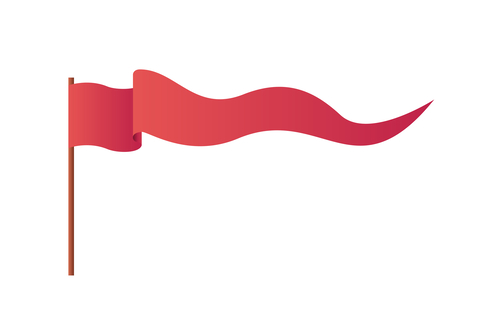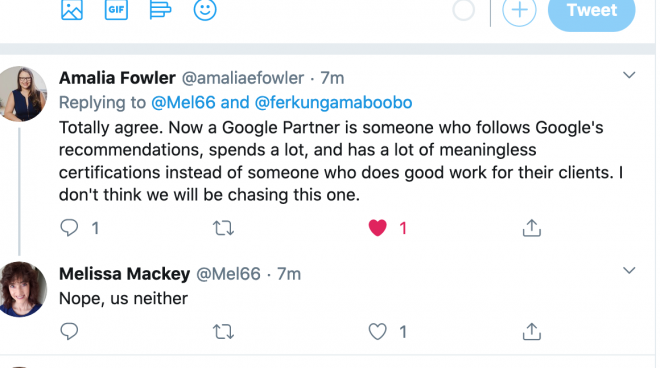In the 10 years I’ve been running my business, never once has a prospective client asked if my agency is a Google Ads Partner.
Nonetheless, my team and I took it upon ourselves to become a Google Ads Partner (at the Premier level) anyway.
For a long time, becoming a Google Ads Partner was considered best practice. And it came with a few benefits, like having an assigned Google Ads rep and some additional Google training (if you were lucky).
Besides, meeting the requirements to become a Partner wasn’t onerous. So why not?
But recently, Google announced that it will be changing its Partner program by introducing new requirements. (UPDATE: Google recently announced that it will be pushing these changes to 2021.)
Which has many PPC pros alarmed.
Why? Because they essentially require Partners to put the goals of Google above the goals of their own clients.
Which has me wondering if the Google Ads Partner badge is now a red flag instead of a symbol of trust.

The New Google Ads Partner Requirements
So what exactly are these new requirements for Google Ads Partner status? And what are the concerns with each?
Good questions. Let’s break the requirements into three parts: ad spend, training and performance.
1. Ad spend
Under the new requirements, agencies have to meet a $20,000 USD 90-days spending target (up from $10,000) with the idea of showing healthy activity in the account.
For most agencies, this shouldn’t be an issue. But still, it does make me wonder. Does more spending really make you a better agency? Will smaller agencies pressure clients to increase their ad spend so they won’t lose their status?
2. Training
Today, agencies need to have one account user certified in Google Ads. We’ve always gotten all of our team members certified, but it’s been a bit of a joke, to be frank.
We’re not big fans of Google Ads training because we find it heavily biased towards actions that benefit Google instead of the account owner. So while our team members go through Google certification training, they also have to “unlearn” some of that training.
And the training itself is also a bit of a joke, with many of our team members completing it in just one day.
Under the new requirements, 50 percent of eligible users need to get updated certifications. Which seems like an exercise in jumping through hoops rather than anything truly useful.
3. Performance
The performance requirements as they exist are a bit vague. Here’s how Google explains it:
Meet the performance requirement by delivering solid overall ad revenue and growth, and maintaining and growing your customer base.
These requirements were never a problem. Of course we want to do that for our clients!
But under the Google Ads Partner program, agencies will also be required to achieve a 70 percent Google Ads optimization score.
And this is where things get dicey.
A 70 percent Google Ads optimization score may sound reasonable on the surface, but it’s actually outrageous. Here’s an example that demonstrates why:

This is a screenshot of the Google Ads’ recommendations from one of our client accounts. As you can see, the optimization score is 66.5 percent — short of the 70 percent Google Ads Partner requirement.
However, in spite of this rating, we’ve actually gotten excellent performance for this client, and they’re very happy with the results.
Also, according to these recommendations, we should hoist our score by 13 percent by adding automated bidding.
But guess what? We’ve tested and tested and tested automated bidding for this client, and it simply doesn’t work.
In a way, I’m not surprised given the nature of this client’s business. The client manages events and has new ads going up every day. We run those ads for three to seven days before we pause them.
This arrangement would never work with Google’s algorithm because Google’s machine learning requires more time and data to perform well. It simply can’t keep up with this breakneck pace.
I recently wrote about the many issues with the Google Ads optimization score for Search Engine Journal. Many of Google Ads’ recommendations don’t make sense for our clients or would be detrimental. This isn’t surprising when you realize that the recommendations are automatically generated — and Google’s machine learning is a long way from perfect.
This conversation on the Marketing Clock podcast provides a good summary of the issues involved:
The Reaction from PPC Pros
Many PPC pros are interpreting this change as another step in the process of Google’s pushing agencies off the Google Ads platform.
(Google isn’t a fool. They see agencies acting as a protective intermediary between Google and account owners, and it would love to own that piece of the pie.)
Here’s one sample of the discussions I’m seeing on Twitter:

Should You Put Any Stock in Google Ads Partner Status?
I’m not saying you should avoid PPC pros that are Google Ads Partners. (At least not yet.)
Heck, we still hold that status, at least for the time being. And I’m undecided as to whether we’ll ditch it.
To be honest, we wouldn’t be giving up much if we were to forego the whole thing. After all, we’ve seen a serious decline in the expertise of the Google reps we’ve been assigned. So what was once a benefit isn’t much of one anymore.
And I don’t get the feeling that our clients care much about Google Partner status either. As long as we can deliver the goods, they’re happy.
I’m not sure where the Google Ads Partner program is going.
But I promise you that we’ll never put the demands of Google (whether it’s acquiring partner status or something else) above the needs of our clients. That I know for sure.






